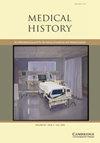A vaccination romance: Rider Haggard’s Dr. Therne (1898) in the vaccination debate
IF 1.1
2区 哲学
Q4 HEALTH CARE SCIENCES & SERVICES
引用次数: 0
Abstract
Abstract Henry Rider Haggard, the famed author of adventure romances, wrote the novel Dr. Therne (1898) in response to weakening compulsory smallpox vaccination laws, thus entering one of the most heated debates of the late nineteenth century. With Dr. Therne, Haggard aimed to intervene in the lives of the many working-class anti-vaccinationists who, from the 1850s onwards, mobilised to evade what they perceived as a gross – and targeted – extension of state power at the expense of individual rights. Recovering the novel, which has not yet received scholarly attention from historians of medicine, reveals the way fiction was called upon to change minds during a crucial period of Victorian medicine, one that witnessed a climactic shift in public health intervention. This article will examine the reception of Dr. Therne in various print media – middle-class London papers, medical journals and working-class, anti-vaccinationist publications – to consider some new dynamics of the debate which the disagreement over Haggard’s polemic exposes, including the perceived power of fiction (when properly priced and distributed) to change minds, and the contested role of the evangelical press. Additionally, a discussion of the different iterations of Dr. Therne, and a look at an exceptional anti-vaccinationist response in the form of a competing novel, illustrates that pro- and anti-vaccinationists alike contributed to a moment in late Victorian society when the role of fiction was considered a worthy contender in a debate ostensibly about fact.接种疫苗的浪漫:赖德·哈格德在疫苗接种辩论中的瑟恩医生(1898)
著名冒险小说作家亨利·莱德·哈格德(Henry Rider Haggard)写了小说《塞恩博士》(1898),以回应强制性天花疫苗接种法律的削弱,从而进入了19世纪末最激烈的辩论之一。与瑟恩博士一起,哈格德的目标是干预许多工人阶级的反疫苗主义者的生活,这些人从19世纪50年代开始动员起来,以逃避他们认为的以牺牲个人权利为代价的国家权力的粗暴和有针对性的扩张。这部小说尚未得到医学历史学家的学术关注,但它的恢复揭示了在维多利亚医学的关键时期,小说是如何被要求改变人们的想法的,这一时期见证了公共卫生干预的高潮转变。本文将考察各种印刷媒体(伦敦中产阶级报纸、医学期刊和工人阶级、反疫苗主义者出版物)对瑟恩博士的接受情况,以考虑围绕哈格德论战的分歧所暴露的一些新的辩论动态,包括小说(在合理定价和发行的情况下)改变人们思想的感知力量,以及福音派媒体的有争议的角色。此外,通过对瑟恩博士的不同版本的讨论,以及对以一本与之竞争的小说形式出现的一种特殊的反疫苗主义者的回应,可以看出,支持和反对接种疫苗的人都为维多利亚晚期的社会做出了贡献,当时小说被认为是一场表面上关于事实的辩论中有价值的竞争者。
本文章由计算机程序翻译,如有差异,请以英文原文为准。
求助全文
约1分钟内获得全文
求助全文
来源期刊

Medical History
医学-科学史与科学哲学
CiteScore
1.60
自引率
0.00%
发文量
25
审稿时长
>12 weeks
期刊介绍:
Medical History is a refereed journal devoted to all aspects of the history of medicine and health, with the goal of broadening and deepening the understanding of the field, in the widest sense, by historical studies of the highest quality. It is also the journal of the European Association for the History of Medicine and Health. The membership of the Editorial Board, which includes senior members of the EAHMH, reflects the commitment to the finest international standards in refereeing of submitted papers and the reviewing of books. The journal publishes in English, but welcomes submissions from scholars for whom English is not a first language; language and copy-editing assistance will be provided wherever possible.
 求助内容:
求助内容: 应助结果提醒方式:
应助结果提醒方式:


